Dyson PH04 review: The ultimate air purifier for $920?
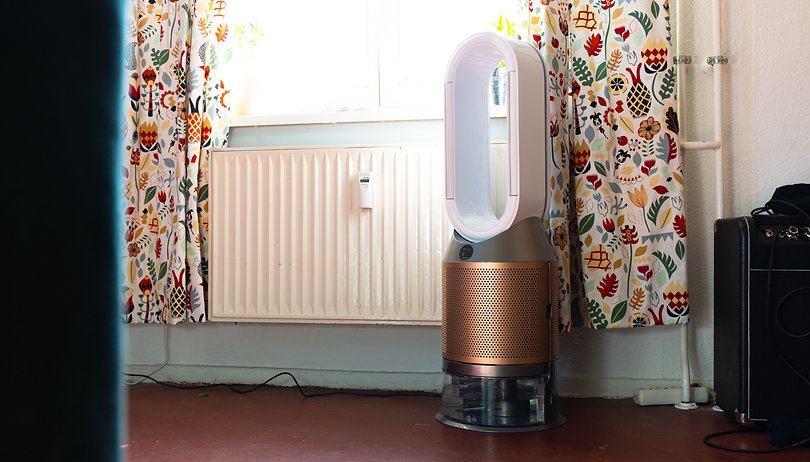

With the PH04, Dyson offers a smart air purifier that also doubles up as a humidifier. However, the "Dyson PH04 Purifier Humidify+Cool Formaldehyde Humidifier" is the manufacturer's flagship model for a hefty $920. In this NextPit review, we did our best to find out whether this premium home appliance at a premium price is worth picking up!
Good
- Extremely powerful air purification with an infrared chamber
- Wide range of smart home functions including a top-notch app
- Airflow can be controlled precisely
- Built-in humidifier
Bad
- Very expensive
- Rather heavy (8.29 kilograms)
- Quite loud
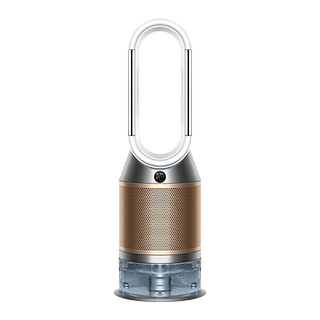
The Dyson PH04 in a nutshell
The Dyson PH04 is one of the best air purifiers in the market currently with an expensive price tag of $920. The manufacturer does not disappoint with this home appliance that offers extremely thorough air purification which includes the killing of bacteria and viruses via its infrared chamber and humidifier.
The bladeless design also introduces advantages when it comes to controlling airflow, all of which can be directed precisely and conveniently via the app and in the smart home.
Apart from the prohibitively high price tag, the only real points of criticism would be the hefty weight, the lack of compatibility with the Matter standard, and making a racket when you crank up the fan settings.
Design & Set-Up
The PH04 features Dyson's famous bladeless design, letting you put your hand through the air purifier without any issue. The design also allows for a 90-degree rotation of the airflow as well as a 180-degree reversal. The design also made room at the base to store filters as well as a large water tank. Considering the amount of money you need to fork out for this, to find that the Dyson PH04 is mostly made out of plastic is rather disappointing.
What I liked:
- Unique and extremely functional design.
- Convenient operation thanks to its display and haptic buttons.
- Flexible alignment of the airflow.
What I disliked:
- The plastic construction looks a bit cheap.
- Inserting the filters can be rather challenging.
Dyson's fans and air purifiers are real eye-catchers with their bladeless design. Dyson placed the vents in an oval shape, sporting a large hole in the center. Whenever the vents generate airflow, ambient air is drawn in through the oval hole while amplifying the airflow. This phenomenon, also known as "Bernoulli's principle", is illustrated in the following YouTube video:
Dyson's fan design offers additional advantages for everyday use. For starters, the entire device does not move when the airflow rotates, where you can also reverse the airflow by a whopping 180 degrees. When reversing the airflow, Dyson allows you to choose between a tilt angle of 45 and 90 degrees. There is a "breeze" mode that distributes air evenly by quickly wiggling the vents back and forth.
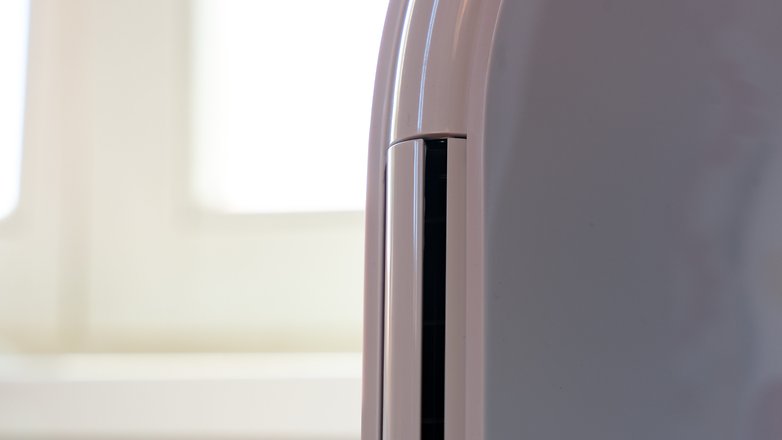
Air is sucked into the base of the air purifier, in which Dyson integrated two fans and a water tank. The setup process is mostly a no-brainer, but the overall build quality is far too flimsy for a $920 air purifier. I was never really sure of myself when inserting the fans, wondering whether I did it correctly. The reason behind this lack of confidence? Dyson relies on quite a number of soft plastic, which does not really live up to the manufacturer's premium image.
The device is operated via two buttons and a high-quality LCD display. In addition, Dyson included a high-quality remote control that magnetically sticks to the casing, as is the case with all Dyson fans. In this instance, it is located on the upper side where the remote control tends to fall down. In addition, the smartphone doubles up as the control center, which I will discuss in the smart features later.
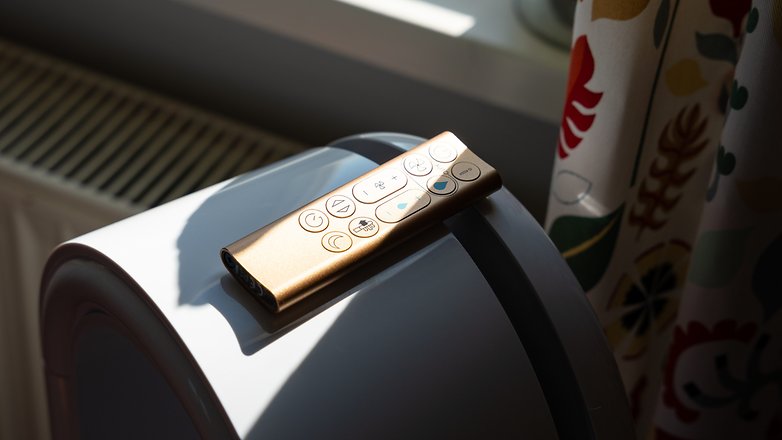
Setting up the Dyson PH04 on your smartphone is basic overall. You download the Dyson app, hold your smartphone up near the air purifier, and the connection will be established over NFC, where you can also connect the device to your WLAN.
Filter and cleaning performance
As the name suffix "Purifier Humidify+Cool Formaldehyde Humidifier" suggests, the Dyson PH04 is a real all-rounder. For example, it filters 99.95% of ultra-fine particles from the air, can break down gases and formaldehyde, filter viruses like COVID-19, and improve indoor air quality by humidifying it. Unlike many other competing products, the DH04 also claims to kill bacteria via UV rays.
What I liked:
- Diverse and high-quality filter functions.
- Actively kills bacteria and viruses.
- Integrated humidifier.
What I disliked:
- No active air cooling.
- It can be quite noisy.
With a 99.95 percent cleaning performance of minute particles under 0.1 micrometers, the Dyson PH04 clearly places itself at the top of the air purifier food chain. Pollen, fine dust, bacteria, and viruses are confidently removed from the air you breathe.
A special feature here is how Dyson kills bacteria and viruses using UV light at a wavelength of 275 nanometers. At the same time, the device is certified according to the HEPA H13 standard, where it prevents pollutants from escaping from the filters into the ambient air.
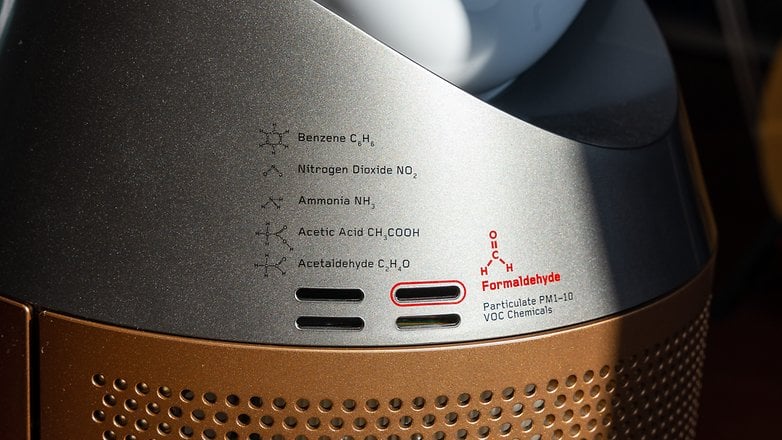
Apart from the infrared chamber and the air filter, the Dyson PH04 is similar to other models that NextPit reviewed, including the Philips AC3033/10 (review) and IKEA Starkvind (review), by including an activated carbon filter. This allows Dyson to filter odors and gases from the air in addition to particles, and volatile organic compounds are also removed.
The sensors will detect the amount of volatile organic compounds which are indicated as VOC in the app, as well as the presence of NO2 (nitrogen dioxide) in your room. The air purifier will then immediately react to correct the situation whenever the chemical count in the air gets dangerously high.
A special feature of the PH04, in addition to the removal of small particles and gases, is the elimination of formaldehyde in your indoor air. This pollutant is released via the likes of cigarettes or paint evaporation. A solid-state formaldehyde sensor will detect the contamination, and a catalytic filter then breaks down the molecules into harmless water and carbon dioxide.
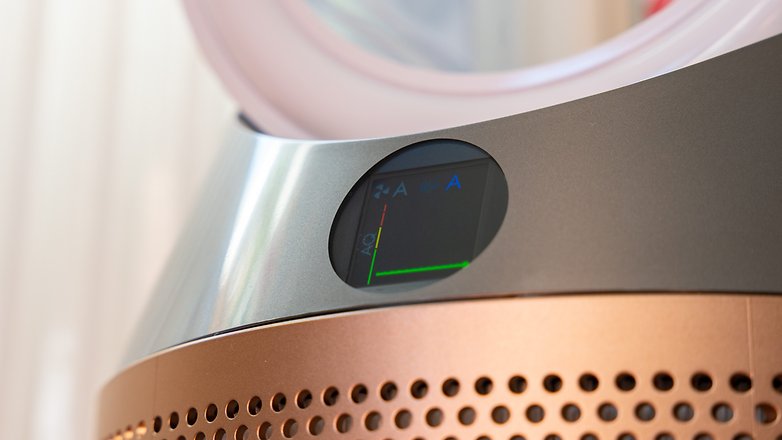
In addition to its excellent cleaning performance, the Dyson PH04 also improves indoor air quality by humidifying it. For this purpose, a 5L water tank sits at the bottom of the chassis.
According to the manufacturer, this amount of water should be enough for 36 hours of air humidification. However, that doesn't mean you have to fill the tank every day and a half. Dyson's humidifier only becomes active when the humidity level in your room air falls below a certain mark.
You can rely on this autonomous operation of the Dyson PH04 throughout the day. When enabled to run in its respective automatic modes, the air purifier constantly monitors ambient air and intervenes whenever there is a need for cleaning or humidification.
This is easily illustrated when opening a window in spring. The pollen load in the room increases, and the PH04 recognizes this load of minute particles automatically, and starts cleaning by itself.
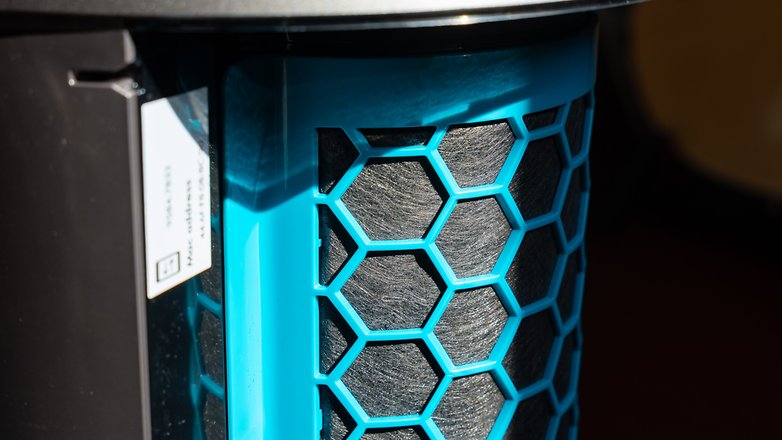
Although the PH04 is Dyson's largest air purifier model, it was only designed for rooms with a maximum floor area of 40 m². That's a bit small compared to other manufacturers. Philip's range of air purifiers can manage areas of up to 104 m² of floor space. At the same time, Dyson's air purifier is rather heavy at 8.29 kg, making it inconvenient to shift around to different rooms.
Another somewhat annoying bit in everyday use was the operating noise, which is especially obvious at high fan speeds. However, a slight rattling is also noticeable even at the lowest level, which would disturb light sleepers in the bedroom.
Smart home functions
Dyson makes its PH04 a nifty smart home companion with a useful app. The manufacturer listed Alexa, Siri, and Google Home as supported voice assistant systems. It is also worth mentioning that the display of real-time data at home works without having to share your location.
What I liked:
- The companion app is not only functional but visually interesting.
- Access is possible from anywhere with a WLAN connection.
- Diverse control options via voice commands.
What I disliked:
- No Matter compatibility.
- Information from sensors cannot be used for automation purposes.
The PH04 is part of Dyson's smart home range. To set it up, download the MyDyson app to your smartphone and connect the air purifier to your Wi-Fi network. You can then set up the air purifier with smart home systems from Amazon, Apple, and Google. The variety of functions that Dyson allows to operate via voice control is particularly impressive.
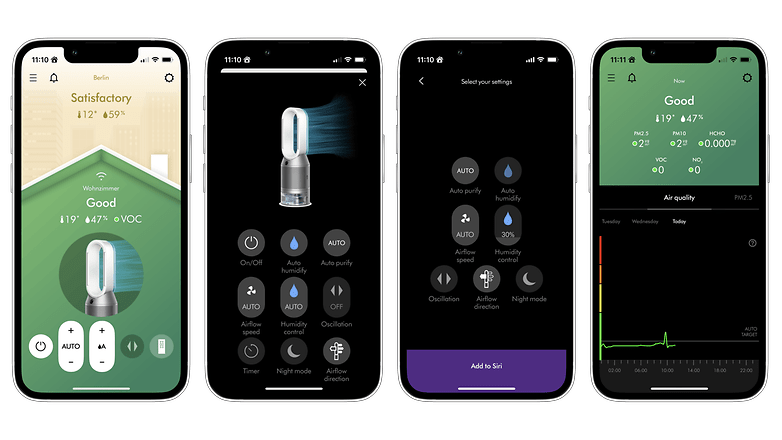
If you were to configure the PH04 via Siri, you will see the familiar control panel, which you can also use to control the air purifier via your smartphone. You can set a desired action and speak a voice command here. This makes the PH04 much smarter than the Philips AC3033/10, as the Philips model only understands a handful of voice command functions.
Unfortunately, Dyson does not offer compatibility with Matter for now, which is a pity as the new smart home standard allows numerous systems to communicate with each other.
The MyDyson app is extremely useful. It provides a wide range of information in a nice interface, can be accessed from anywhere in the world (as long as there is an Internet connection), and allows you to control all functions of the air purifier remotely.
You can choose a location for which the Dyson app displays real-time data of the room temperature, air quality, and more. You can do so without having to share your location, which is a bonus when it comes to privacy.
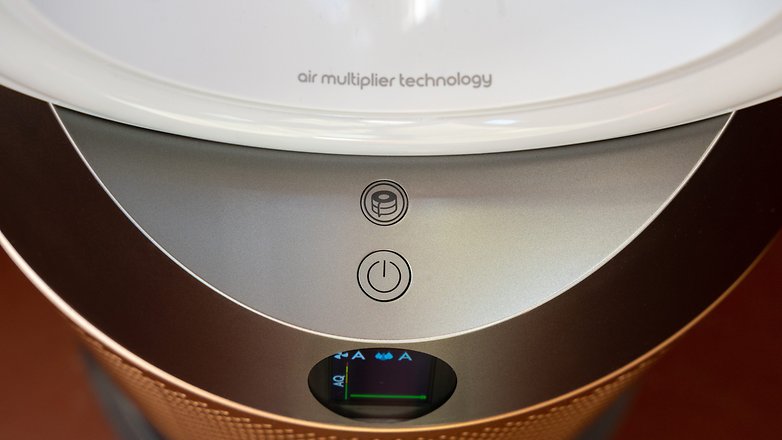
It is a bit annoying that you cannot use the interesting data collected by the Dyson PH04 for smart home automation. Theoretically, it would otherwise be possible to turn on a warning light in the smart home when poor air quality is detected. However, since Dyson does not provide access to such information, this is not possible.
Conclusion
Compared to other air purifiers for the smart home, the Dyson PH04 offers a few extras. For example, the air purifier filters not only tiny particles, organic compounds and gases, but also formaldehyde, which is produced when one smokes cigarettes or cooks.
Viruses and bacteria found in the PH04's air filter are also killed by its infrared light. In addition, the filters are sealed according to the HEPA H13 standard, so pollutants actually stay in the device and do not escape.
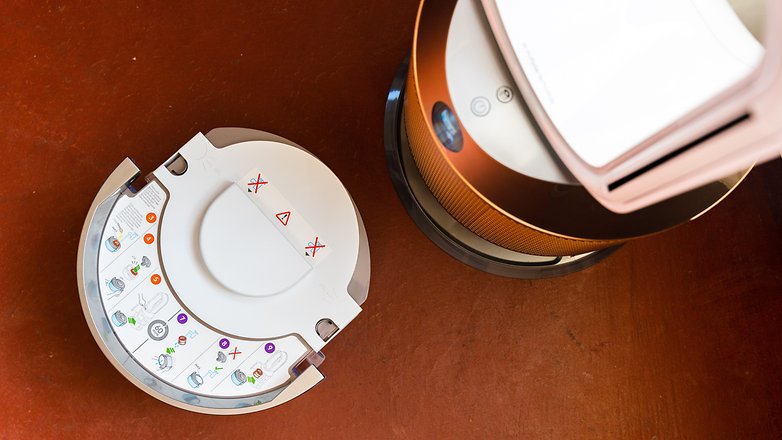
Dyson combined this exceptional cleaning performance with strong smart-home features that allow you to control almost all functions via voice commands. Connectivity with Alexa, Google Home, and Siri is also a positive point, but support for Matter is lacking. Together with the MyDyson app, Dyson still offers a whole lot more than what other smart air purifiers do in the smart home sector.
However, these excellent features come at a hefty price tag of $920. At this prohibitive cost, it is very annoying that Dyson made the entire device out of plastic. Despite having a pretty external design, this makes the air purifier look less premium than one would expect upon purchase. Furthermore, it tips the scales at 8.29 kg, which is a bit too heavy to be used comfortably in different rooms.
However, if you want to improve the air quality in your home to the best possible quality, like the typical Dyson design, and want a variety of smart home features at your fingertips, the Dyson PH04 is a particularly good choice. No other device in our smart air purifier comparison filters the air better.







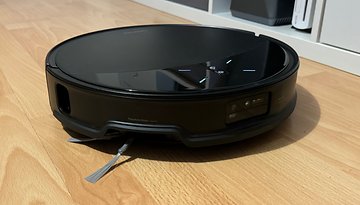
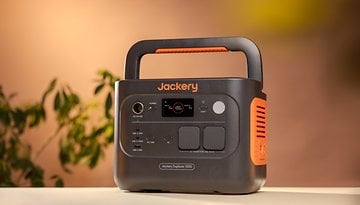
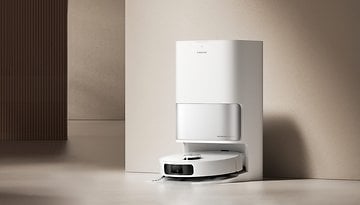

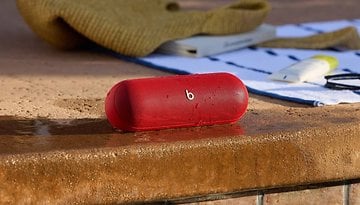
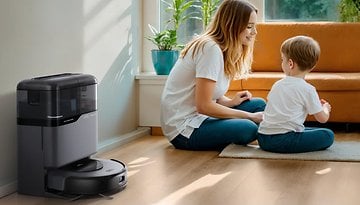




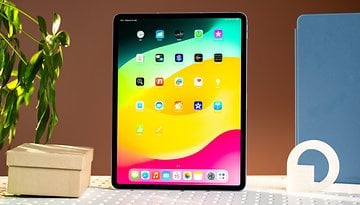
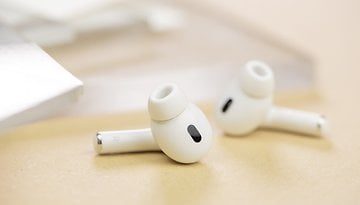


This largely strikes me as pointless.
In the US the most common code for air permeability is 3 ACH 50. That's three whole house air changes per hour under 50 pascals of air pressure. All the old construction doesn't come anywhere close to this. And even with new construction you're moving a lot of air into the home outside of the heating and cooling system.
That's a lot of dirty air moving from the walls to this fan Even even with your windows and doors closed.
You can do a lot towards better air purity with some air sealing of your home so you control what dirty air is even coming in to start with before spending on a system like this.